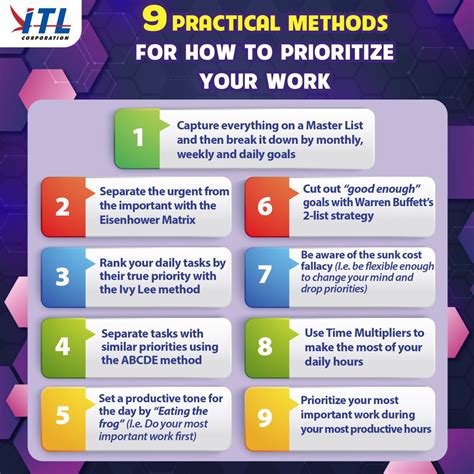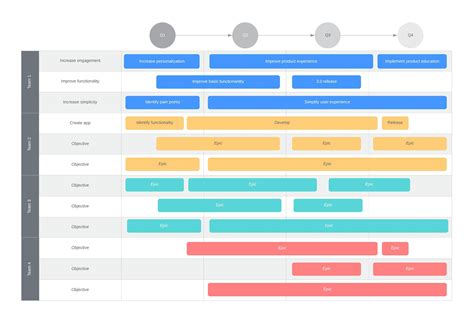In today's fast-paced world, time has become one of the most valuable resources. It is a constant companion that waits for no one. To harness its power and make the most of every precious minute, mastering effective time management is essential. By implementing strategic techniques and adopting a proactive mindset, you can unlock the hidden potential within each day.
Discovering the art of efficient time management is like unraveling a mystery that has the potential to transform your life. It involves not just the management of minutes and hours, but a deeper understanding of your personal goals, priorities, and aspirations. Through a series of practical steps, you can learn to navigate the intricacies of time to achieve a harmonious balance between work, leisure, and personal growth.
Embracing effective time management requires a multi-faceted approach that encompasses both the external and internal dimensions of your daily routine. It involves not only the optimization of tasks and schedules, but also the cultivation of discipline and focus. By employing proven strategies and techniques, such as prioritization, delegation, and mindful planning, you can propel yourself towards success, one step at a time.
In this article, we will explore a plethora of invaluable tips and techniques to help you unlock the full potential of your day. From the art of setting SMART (Specific, Measurable, Achievable, Relevant, Time-bound) goals to the power of breaking tasks into manageable chunks, each tip is designed to enhance your productivity and maximize your results. By embracing these insights, you can transform your relationship with time and unlock new levels of efficiency in your personal and professional life.
Prioritize Your Tasks: The Key to Efficiency

Effective time management is all about making the most of your available time and resources. One crucial aspect of achieving this is by prioritizing your tasks. When you prioritize your tasks, you strategically organize them based on their importance and urgency, allowing you to focus on the most critical ones first and maximize your efficiency.
1. Set Clear Goals: Start by clearly defining your goals and objectives. This will help you understand what needs to be done and give you a sense of direction. Having clear goals also enables you to determine which tasks align with your objectives and should be prioritized.
2. Identify Urgent and Important Tasks: It's essential to differentiate between tasks that are urgent and those that are important. Urgent tasks require immediate attention and have strict deadlines, while important tasks contribute to long-term goals and have a significant impact on your overall success. Prioritize tasks that fall into both categories accordingly.
3. Evaluate Task Complexity: Consider the complexity and time required to complete each task. Some tasks may be more straightforward and can be quickly accomplished, while others may be more complex and time-consuming. Prioritize tasks that require more time and effort to avoid unnecessary delays.
4. Determine Dependencies: Some tasks may be dependent on others, meaning they cannot be started or completed until certain prerequisites are met. Identify these dependencies and prioritize tasks accordingly, ensuring a smooth workflow and preventing bottlenecks in your work.
5. Apply the Eisenhower Matrix: The Eisenhower Matrix is a popular tool for prioritizing tasks. It categorizes tasks into four quadrants: important and urgent, important but not urgent, urgent but not important, and neither important nor urgent. By using this matrix, you can easily determine which tasks deserve your immediate attention and which can be delegated or eliminated.
6. Be Flexible and Adapt: Priorities may change as new tasks arise or circumstances evolve. It's crucial to be flexible and adapt to these changes. Regularly review and reassess your task list to ensure you're still prioritizing effectively and making the most efficient use of your time.
By prioritizing your tasks effectively, you can optimize your productivity, reduce stress, and achieve your goals more efficiently. Make it a habit to regularly assess and adjust your task list based on changing demands and stay focused on what truly matters.
Set Clear Goals: Mapping Your Path to Success
Establishing distinct objectives and creating a visual roadmap to achieve them is crucial for attaining success in managing your time effectively. By setting clear goals, you provide direction and purpose to your daily activities, enabling you to stay focused and make progress toward your desired outcomes.
- Define Your Objectives: Begin by identifying what you aspire to accomplish, whether they are short-term or long-term goals. This step involves determining your priorities and envisioning the end result you desire.
- Create a Plan of Action: Once you have established your goals, strategize the steps necessary to accomplish them. Break down the larger objectives into smaller, more manageable tasks that can be easily tackled.
- Set Realistic Timelines: Assign specific timelines and deadlines to each task to ensure that you stay on track. Be mindful of the time required to complete each task and make adjustments to your schedule when necessary.
- Monitor and Evaluate: Regularly assess your progress towards achieving your goals. Reflect on your accomplishments and identify any challenges or obstacles that may be hindering your progress. This iterative process will allow you to make necessary adjustments and maintain momentum.
- Stay Motivated: Keep your goals visible and remind yourself of the reasons why they matter to you. Celebrate small victories along the way and seek support from others who can provide encouragement and accountability.
By setting clear goals and actively working towards them, you pave the way for enhanced time management and ultimately increase your chances of accomplishing what truly matters to you.
Plan Your Day: A Roadmap to Productivity

In the quest for optimal time utilization, crafting a well-thought-out plan for your day is paramount. This strategic roadmap will guide your actions, ensuring that you make the most of your time and accomplish your tasks efficiently and effectively.
Establish Priorities: Begin by identifying your highest priorities. Knowing what truly matters to you will provide clarity and help you allocate your time effectively. This will prevent you from getting lost in less important tasks and focus your energy on what brings you the greatest value and satisfaction.
Set Realistic Goals: Break down your priorities into specific, measurable, attainable, relevant, and time-bound goals. This approach allows you to monitor progress, stay motivated, and adapt as needed. Be mindful of setting achievable goals that challenge you without overwhelming your available time and resources.
Create a Schedule: Organize your day by creating a detailed schedule that allocates time slots for each task and commitment. Consider your energy levels throughout the day and assign the most demanding tasks to the periods when you are most alert and focused. Be realistic with your time estimates and allow for buffer periods to account for unexpected events.
Practice Time Blocking: Implement the time-blocking technique to enhance your productivity. Allocate specific time blocks for different types of tasks, grouping similar activities together. This method allows you to maintain focus, minimize distractions, and increase efficiency by immersing yourself in a single task without interruption.
Maximize Productivity Windows: Identify your most productive moments and leverage them to tackle challenging and vital tasks. Whether you are an early bird or a night owl, align your schedule to optimize these periods for peak performance, enabling you to make substantial progress and accomplish important goals.
Regularly Review and Adjust: Periodically review your schedule to evaluate your progress and make necessary adjustments. Reflect on your achievements, identify areas for improvement, and adapt your plan accordingly. Stay flexible and open to changes, ensuring that your schedule remains aligned with your current priorities and objectives.
By diligently planning your day and adhering to your well-crafted roadmap, you can elevate your productivity, make the most of your time, and achieve your goals with greater efficiency and satisfaction.
Break Down Big Tasks: Conquer the Mountain One Step at a Time
Divide and conquer! When faced with large and intimidating tasks, it can be easy to feel overwhelmed and unsure of where to begin. However, by breaking down these big tasks into smaller, more manageable steps, you can take on the challenge with confidence and effectively manage your time.
One approach to breaking down big tasks is to create a checklist or a to-do list. Start by identifying the main components or subtasks that make up the larger task. By breaking it down into smaller parts, you can tackle each one individually, allowing you to focus your energy and attention more effectively. As you complete each subtask, you can check it off the list, giving you a sense of accomplishment and motivation to keep going.
Another strategy is to set specific and realistic deadlines for each subtask. By doing so, you create a sense of urgency and accountability, ensuring that you stay on track and make progress towards completing the larger task. This approach helps prevent procrastination and ensures that you allocate enough time and effort to each step along the way.
Additionally, consider prioritizing the subtasks based on importance or urgency. Determine which steps are critical to the overall completion of the task and focus on completing those first. This way, even if you don't have time to finish everything, you have successfully tackled the most vital aspects. Prioritization allows you to make effective use of your time and ensures that you address the most significant portions of the task first.
Remember, the key to conquering big tasks is to approach them one step at a time. By breaking them down into smaller, more manageable steps, creating checklists, setting deadlines, and prioritizing, you can efficiently manage your time and make steady progress towards your goals. So, don't let daunting tasks overwhelm you – embrace the challenge and conquer the mountain one step at a time!
Avoid Procrastination: Don't Let Time Slip Away

If you want to make the most of your precious time, it's crucial to stay focused and avoid the trap of procrastination. In this section, we'll explore effective strategies to overcome the tendency to delay tasks and ensure that time doesn't slip through your fingers.
1. Conquer your inner resistance: Procrastination often stems from a lack of motivation or fear of failure. By acknowledging and addressing these underlying emotions, you can better equip yourself to tackle tasks head-on and avoid unnecessary delays.
2. Break tasks into manageable chunks: Overwhelming tasks can be a breeding ground for procrastination. Break down larger projects into smaller, more manageable tasks, allowing you to make steady progress and keep your mind focused on achievable goals.
3. Set deadlines and prioritize: Time management requires setting clear deadlines for your tasks. Ensure that you assign realistic time frames to different activities, giving each the appropriate priority. By establishing a clear roadmap, you can avoid wasting time on less important tasks and stay on track.
4. Minimize distractions: Distractions can quickly derail your productivity. Identify and eliminate potential distractions, such as notifications on your phone or unnecessary web browsing. Creating a dedicated work environment and building a routine that minimizes interruptions can work wonders for your time management efforts.
5. Utilize effective time blocking techniques: Time blocking involves scheduling specific blocks of time for different tasks or activities. By assigning specific time slots to important responsibilities and adhering to your schedule, you can establish a sense of discipline and maximize your productivity.
6. Harness the power of visualization: Visualization techniques can help you mentally prepare for tasks, overcome resistance, and stay focused. Visualize the successful completion of each task, imagining the positive outcomes and the satisfaction that comes with ticking items off your to-do list.
7. Seek support and accountability: Don't be afraid to ask for help or seek accountability from others. Sharing your goals and progress with a friend, colleague, or mentor can provide motivation and ensure that you stay on track to avoid procrastination.
In conclusion, by understanding the causes of procrastination and implementing effective strategies like conquering inner resistance, breaking tasks, setting deadlines, minimizing distractions, utilizing time blocking techniques, harnessing visualization, and seeking support, you can successfully avoid procrastination and make the most out of your valuable time.
Learn to Delegate: Sharing Responsibilities for More Time
In the pursuit of better time management, one valuable strategy is to master the art of delegating tasks and sharing responsibilities. By entrusting others with certain duties, you can free up your time and focus on more important matters.
When you refuse to delegate tasks, you may inadvertently overwhelm yourself and limit your productivity. Learning to trust others and assigning them responsibilities can not only save you time but also foster collaboration and growth within your team or organization.
- Identify your strengths and weaknesses: Reflect on your own skills and expertise to better understand which tasks you can delegate effectively. By recognizing your strengths, you can delegate tasks that fall outside of your expertise to others who are better suited for the job.
- Build a reliable team: Surround yourself with competent individuals who you can trust to handle tasks efficiently. Delegate responsibilities to team members based on their strengths and provide them with the necessary resources and support to succeed.
- Communicate clearly: Clearly define the tasks you are delegating, including deadlines, expectations, and desired outcomes. Effective communication ensures that everyone understands their responsibilities and reduces the need for micromanagement.
- Provide necessary guidance: While delegating tasks, ensure that you provide sufficient guidance and training to ensure success. Offer support and clarification whenever needed to ensure that the delegated tasks are completed accurately and on time.
- Establish accountability: Set up a system to monitor the progress and completion of delegated tasks. Regularly check in with the assigned individuals, provide feedback, and offer assistance if necessary. This promotes a sense of accountability and ensures that tasks are completed to the best of everyone's ability.
Learning to delegate effectively is a skill that can benefit both individuals and organizations. By sharing responsibilities, you can maximize your time, enhance productivity, and facilitate collaboration within your team or workplace.
Minimize Distractions: Stay Focused on What Truly Matters

In today's fast-paced world, finding ways to maximize productivity and make the most of our time has become increasingly important. One crucial aspect of effective time management is learning to limit the distractions that divert our attention and prevent us from accomplishing our goals.
Distractions are all around us, constantly vying for our attention. They can come in the form of social media notifications, incoming emails, or even the temptations of our own wandering thoughts. However, by prioritizing what truly matters and creating a conducive environment for focused work, we can regain control over our time and accomplish more.
- Prioritize Your Tasks: Make a list of the most important tasks you need to complete and tackle them first. This way, you can ensure that you devote your energy to the tasks that will have the greatest impact.
- Set Clear Goals: Establish specific, achievable goals for each day. By knowing exactly what you want to accomplish, you can stay on track and avoid getting sidetracked by less important tasks.
- Manage Your Technology Use: While technology provides us with countless benefits, it can also be a major source of distraction. Set designated times to check emails and social media, and consider using website blockers or turning off notifications during periods when you need to focus.
- Create a Distraction-Free Workspace: Designate a specific area where you can work without interruptions. Keep your workspace tidy and free from unnecessary items or distractions, such as personal devices or noisy surroundings.
- Practice Mindfulness: Train your mind to stay focused on the present moment. Practice techniques such as deep breathing or meditation to help calm your mind and reduce the tendency to get easily distracted.
By implementing these strategies and consciously making an effort to limit distractions, you can reclaim your time and concentrate on what truly matters. Remember, the key to effective time management is maintaining focus on your priorities and eliminating unnecessary diversions that hinder your progress.
Practice Time Blocking: Streamline Your Schedule
Incorporate the technique of time blocking into your daily routine to optimize your productivity and manage your schedule more efficiently. Time blocking is an effective strategy for organizing and prioritizing your tasks, allowing you to allocate specific time periods for different activities.
Schedule Optimization: By practicing time blocking, you can streamline your schedule and make the most out of your day. By allocating dedicated blocks of time for different tasks, you eliminate the habit of multitasking and increase your focus and concentration on one task at a time. This helps to improve the quality of your work and allows you to accomplish more in less time.
Task Prioritization: Time blocking enables you to prioritize your tasks effectively by assigning them specific time slots based on their importance and urgency. By dedicating specific blocks of time to your most critical tasks, you ensure their completion and reduce the chances of procrastination. This method enables you to focus your energy on the tasks that matter most and avoid wasting time on trivial or less important activities.
Enhanced Time Awareness: Time blocking fosters an increased awareness of how you utilize your time throughout the day. By setting specific time slots for different activities, you gain a better understanding of how long each task takes and how to better allocate your time in the future. This awareness allows you to identify time-wasting habits and make adjustments to optimize your schedule for maximum productivity.
Improved Work-Life Balance: One of the key benefits of time blocking is the ability to create a balance between work and personal life. By allocating specific time blocks for work-related tasks, you can ensure that your professional responsibilities do not encroach upon your personal time. This allows for more time to engage in activities that nourish your well-being and spend quality time with family and friends, ultimately enhancing your overall satisfaction and happiness.
Incorporating time blocking into your daily routine can transform the way you manage your time. By streamlining your schedule and prioritizing your tasks effectively, you can enhance your productivity, improve your work-life balance, and achieve a greater sense of fulfillment in your day-to-day life.
Boost Your Productivity with Regular Breaks

In order to improve your productivity and make the most of your day, it is crucial to take regular breaks throughout your work hours. These short intervals of rest can be highly beneficial in boosting your overall efficiency and allowing you to maintain a high level of focus and concentration.
Breaks serve as an opportunity to recharge and rejuvenate your mind and body. By stepping away from your tasks for a brief period, you give yourself a chance to relax, refresh, and renew your energy levels. This helps prevent mental fatigue and burnout, enabling you to return to your work with a clear and focused mindset.
During your breaks, engage in activities that help you relax and unwind. You can step outside for a short walk, stretch your muscles, or do some deep breathing exercises. These simple activities can help relieve stress, increase blood flow, and improve your mood, leading to enhanced productivity when you resume your tasks.
Moreover, regular breaks can also foster creativity and problem-solving abilities. When you step away from a task, especially if you have been struggling with it, your mind gets a chance to process information subconsciously. This can often lead to new insights and fresh perspectives, allowing you to approach the task from a different angle and find innovative solutions.
While it may seem counterintuitive, taking breaks actually helps you save time in the long run. By allowing yourself short intervals of rest, you prevent mental and physical exhaustion, which can impair your performance and make tasks take longer to complete. By including regular breaks in your time management routine, you become more efficient and accomplish more in less time.
| Key Benefits of Taking Regular Breaks: |
| 1. Enhanced productivity and focus |
| 2. Reduced stress and improved mood |
| 3. Increased creativity and problem-solving abilities |
| 4. Prevention of mental fatigue and burnout |
| 5. Time-saving by improving overall efficiency |
Evaluate and Adjust: Continuously Enhancing Time Mastery
In the pursuit of optimizing our utilization of time, it is essential to embrace a mindset of continuous improvement. Evaluating and adjusting our time management strategies allows us to refine our approach, overcome challenges, and ultimately achieve greater efficiency and productivity.
One key aspect of evaluating our time management practices is to regularly reflect on our daily routines and habits. By critically analyzing how we spend our time, we can identify patterns and areas where improvements can be made. This introspective examination enables us to gain insights into potential time-wasting activities or inefficient processes that hinder our progress.
Furthermore, it is crucial to consider the effectiveness of the techniques and tools we employ in managing our time. What may have worked in the past may not necessarily be the most effective approach in the present. Experimentation with different strategies, such as utilizing digital productivity apps, employing priority-based task lists, or adopting time-blocking techniques, can lead to discovering more efficient ways of utilizing our time.
During the evaluation process, it may be beneficial to seek feedback from trusted sources, whether they be colleagues, mentors, or even relevant literature. An external perspective can offer fresh insights and alternative perspectives on improving our time management skills.
Once we have identified areas that require improvement, the next step is to adjust our practices accordingly. This may involve reorganizing our daily schedule, implementing new workflows, or adopting time-saving techniques. It is essential to be open to change and willing to break old habits that no longer serve us.
However, it is important to keep in mind that time mastery is not a one-time achievement but an ongoing endeavor. As our circumstances and responsibilities change, so too must our time management strategies. Regularly re-evaluating and adjusting our practices ensures that we are consistently adapting and evolving to meet the demands of our dynamic lives.
In summary, evaluating and adjusting our time management approaches allows us to continuously enhance our ability to make the most of our time. Through introspection, experimentation, seeking feedback, and embracing change, we can achieve a higher level of time mastery and unlock our true potential.
FAQ
What are some tips for effective time management?
Some tips for effective time management include setting goals, prioritizing tasks, using a planner or to-do list, eliminating distractions, and delegating tasks when possible.
How can I get the most out of my day?
To get the most out of your day, you can start by identifying your most important tasks, using time-blocking techniques, avoiding multitasking, taking regular breaks, and staying organized.
What is the importance of setting goals in time management?
Setting goals in time management is important because it provides a clear direction and purpose for your tasks. Goals help you prioritize and focus on what truly matters, allowing you to manage your time effectively and avoid wasting it on unnecessary activities.
How do distractions affect time management?
Distractions can significantly impact time management by diverting your attention and wasting valuable time. They can lead to procrastination and lower productivity. It is important to identify and eliminate or minimize distractions to make the most of your time.



